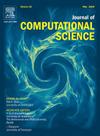New model of HIV-AIDS dynamics based on the Caputo–Fabrizio derivative: Optimal strategies for controlling the spread
IF 3.7
3区 计算机科学
Q2 COMPUTER SCIENCE, INTERDISCIPLINARY APPLICATIONS
引用次数: 0
Abstract
The goal of this study is to introduce a new model to better understand the spread of HIV/AIDS, with a particular focus on individuals who are unaware of their infection status. We propose and analyze a new Caputo–Fabrizio fractional model, examining its local stability around the equilibrium point using the abdicate method tailored for Caputo–Fabrizio derivatives. To assess global stability, we employ linear matrix inequalities (LMI). Furthermore, we formulate a fractional optimal control problem to identify effective strategies for controlling the disease. Numerical simulations are conducted to confirm the stability of the equilibrium and to demonstrate the behavior of the proposed solutions.
基于Caputo-Fabrizio导数的HIV-AIDS动力学新模型:控制传播的最优策略
这项研究的目的是引入一个新的模型,以更好地了解艾滋病毒/艾滋病的传播,特别关注那些不知道自己感染状况的个体。本文提出并分析了一种新的Caputo-Fabrizio分数阶模型,并利用Caputo-Fabrizio导数的舍弃方法检验了该模型在平衡点附近的局部稳定性。为了评估全局稳定性,我们使用线性矩阵不等式(LMI)。此外,我们制定了一个分数最优控制问题,以确定控制疾病的有效策略。数值模拟证实了平衡的稳定性,并证明了所提解的行为。
本文章由计算机程序翻译,如有差异,请以英文原文为准。
求助全文
约1分钟内获得全文
求助全文
来源期刊

Journal of Computational Science
COMPUTER SCIENCE, INTERDISCIPLINARY APPLICATIONS-COMPUTER SCIENCE, THEORY & METHODS
CiteScore
5.50
自引率
3.00%
发文量
227
审稿时长
41 days
期刊介绍:
Computational Science is a rapidly growing multi- and interdisciplinary field that uses advanced computing and data analysis to understand and solve complex problems. It has reached a level of predictive capability that now firmly complements the traditional pillars of experimentation and theory.
The recent advances in experimental techniques such as detectors, on-line sensor networks and high-resolution imaging techniques, have opened up new windows into physical and biological processes at many levels of detail. The resulting data explosion allows for detailed data driven modeling and simulation.
This new discipline in science combines computational thinking, modern computational methods, devices and collateral technologies to address problems far beyond the scope of traditional numerical methods.
Computational science typically unifies three distinct elements:
• Modeling, Algorithms and Simulations (e.g. numerical and non-numerical, discrete and continuous);
• Software developed to solve science (e.g., biological, physical, and social), engineering, medicine, and humanities problems;
• Computer and information science that develops and optimizes the advanced system hardware, software, networking, and data management components (e.g. problem solving environments).
 求助内容:
求助内容: 应助结果提醒方式:
应助结果提醒方式:


